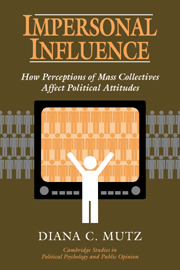Book contents
- Frontmatter
- Contents
- List of Figures
- List of Tables
- Preface
- Acknowledgments
- Part I Theory and Historical Context
- 1 The Generalized Other: Social Influence in Contemporary American Politics
- 2 Beyond Personal Influence: The Rise of Impersonal Associations
- 3 The Origins of Perceptions of Mass Collectives: Mass Media's Role
- Part II Effects of Perceptions of Mass Experience
- Part III Effects of Perceptions of Mass Opinion
- Part IV Conclusion
- Appendix: Methodology
- References
- Index
3 - The Origins of Perceptions of Mass Collectives: Mass Media's Role
Published online by Cambridge University Press: 05 June 2012
- Frontmatter
- Contents
- List of Figures
- List of Tables
- Preface
- Acknowledgments
- Part I Theory and Historical Context
- 1 The Generalized Other: Social Influence in Contemporary American Politics
- 2 Beyond Personal Influence: The Rise of Impersonal Associations
- 3 The Origins of Perceptions of Mass Collectives: Mass Media's Role
- Part II Effects of Perceptions of Mass Experience
- Part III Effects of Perceptions of Mass Opinion
- Part IV Conclusion
- Appendix: Methodology
- References
- Index
Summary
Notwithstanding all the potential created by the historical trends discussed in Chapter 2, how much empirical evidence is there that mass media play an important role in shaping ordinary citizens' perceptions of opinion and experience beyond their immediate life space? This chapter examines both theory and evidence pertaining to this question.
At one level, this hypothesis seems so obvious that it is hardly worth pursuing; how else can people acquire information about collectives beyond their immediate life space and experience? But subtractive logic is a weak foundation on which to build a theory. In fact, many prominent theories of media influence caution against such an assumption, as does a large body of evidence from social psychology. The evidence drawn together in this chapter suggests that the primary reason for confusion is the lack of attention to the multiple levels of judgment on which effects may be assessed. When somewhat subtle differences in the nature of dependent variables are taken into account, findings are surprisingly, if not astonishingly, consistent in supporting media's role in shaping perceptions of collective experience and opinion. Before assessing the case bearing directly on mass media's influence, I consider evidence pertaining to three other possible sources of information on collective experience and opinion: rationalization based on partisan predispositions, personal experience, and interpersonal communication. Finally, I present a general model of the origins of perceptions of collectives and then test the model using two empirical studies, one focusing on media's impact on perceptions of collective opinion and the other, on perceptions of collective experience.
- Type
- Chapter
- Information
- Impersonal InfluenceHow Perceptions of Mass Collectives Affect Political Attitudes, pp. 62 - 96Publisher: Cambridge University PressPrint publication year: 1998



